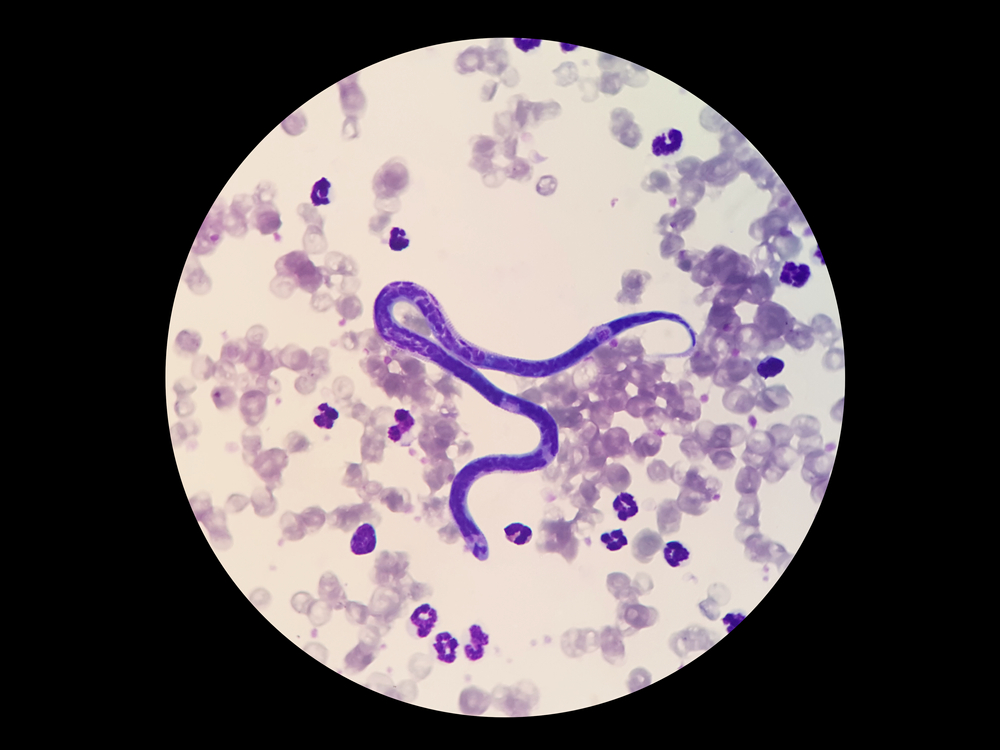Among the various health threats your pet may face, heartworm disease is one that has the potential to become life-threatening. Fortunately, despite its ever-looming threat, heartworm disease is easily prevented, yet the American Heartworm Society (AHS) estimates at least a million U.S. pets are infected with the parasite, putting other pets and wildlife nearby at risk. The Memorial Animal Hospital team wants to ensure all pet owners understand heartworms and how they can protect their furry pals from harm.
What are heartworms?
Heartworms are parasitic worms that live in the heart, lungs, and blood vessels of infected animals. The worms start as microscopic larvae and can grow up to a foot long as adults. Once inside an ideal host, heartworms reproduce and can reach 30 to 100 or more—causing extensive and irreversible tissue damage in many cases.
How do pets get heartworm disease?
Heartworm transmission occurs through the bite of infected mosquitoes. A mosquito that bites an infected animal ingests heartworm larvae that are circulating in that animal’s bloodstream. After a few weeks, the larvae develop into an infective stage and are transferred to a new host when the mosquito bites a susceptible individual. Heartworms are not directly contagious from pet to pet, but the more infected animals in a community, the higher the risk for infection in others. Infected animals with circulating larvae, commonly pet dogs or wild canids, are called infection reservoirs.
Heartworm disease signs in pets
Heartworm infection often causes few to no outward signs and may go unnoticed for months or years, but once the heartworms damage the heart or lungs, pets may show signs that include coughing, decreased appetite, exercise intolerance, weight loss, or difficulty breathing. Left untreated, heartworm disease can lead to heart failure, chronic respiratory disorders, or sudden death. Because heartworm infections are often silent, our veterinarians recommend testing all dogs annually—or more frequently in certain scenarios. Routine testing is not recommended for cats, unless heartworm disease is suspected.
How heartworm affects cats and dogs differently
Dogs and cats are susceptible to heartworm infection, but the disease manifests differently in each species. Dogs are the preferred heartworm hosts and are easily infected, while cats are atypical hosts and more resistant to infection. When heartworms do infect a cat, only a few survive, and they don’t reproduce. However, the presence of only one or two worms can cause a cat’s immune system to overreact and lead to severe respiratory disease or sudden heart failure. Dogs seem more tolerant of the worms and can live for many months or years before serious signs develop.
Heartworm disease treatment in pets
Heartworm disease treatment is complex and costly. Typical dewormers that work against common intestinal parasites won’t kill adult heartworms. Instead, dogs must receive a series of painful injections under close veterinary supervision, along with oral antibiotics and steroids and lengthy cage-rest periods to prevent serious reactions caused by dying worms and associated bacteria. Adult worms may require surgical removal in severe cases. Cats with confirmed heartworm infections are typically treated symptomatically and supportively until the worms die on their own, as the standard canine treatment is unsafe for our feline friends.
Preventing heartworm disease in pets

Preventing heartworm disease in pets is easier, cheaper, and significantly less risky than treating existing infections. Today’s heartworm prevention products are safe, highly effective when given as directed, and come in various forms to suit different needs and preferences. Preventives are typically administered monthly and are designed to kill early stage larvae before they mature and are harder to eliminate. Mosquito-reduction measures, such as using pet-safe repellents, eliminating standing water around your home, and staying indoors during peak mosquito hours, can also help reduce heartworm exposure.
Heartworm disease can significantly threaten your furry pal’s health, but routine heartworm testing and prevention methods are safe and cost-effective methods. Contact our Memorial Animal Hospital team to learn more about recommended heartworm prevention products or to schedule your pet’s next heartworm test or preventive care visit.






Leave A Comment